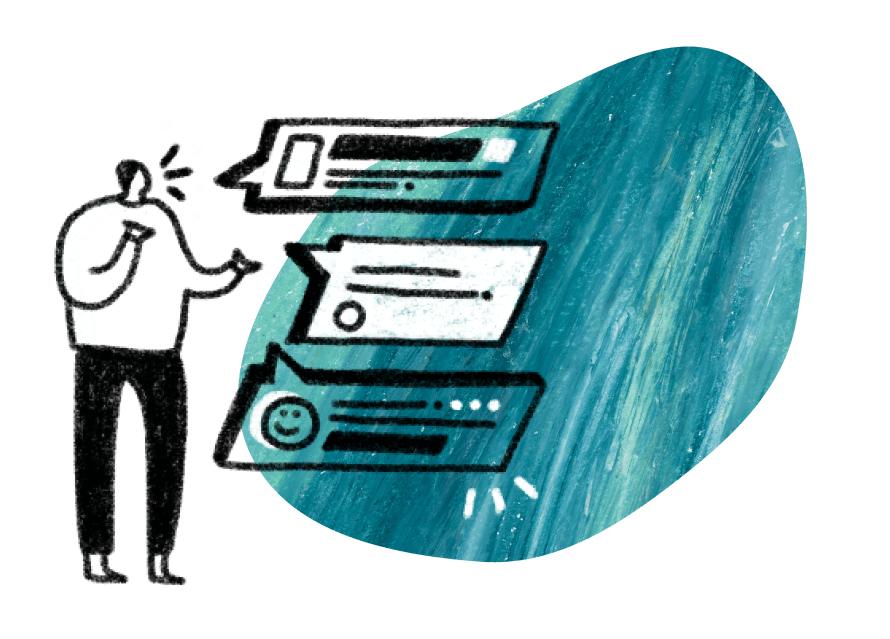I hope you aren’t surprised to find out that the User Interviews team does quite a bit of research.
Enabled by our fearless User Research leader, Roberta, as well as our own recruitment and participant management tools, UItes regularly conduct user interviews and other tests to discover actionable customer insights.
As a new member of the User Interviews team, I wondered about the similarities and differences between Researchers and ‘People Who Do Research’ (PWDRs) as part of their jobs—people like product managers, designers, marketers, and more. How do their goals, challenges, thought styles, and approaches to research differ?
To find out, I conducted a structured discovery research study on PWDRs. Here’s an overview of how I approached the study, what I learned, and how I plan to incorporate these insights into my work.
The approach
For this study, I used User Interviews’s Recruit tool to find, schedule, and communicate with a mix of five PWDRs and a research ops manager with at least three years of experience and from a variety of backgrounds. (Since I’m still learning about research, I was pretty grateful for the tips, templates, and FAQs in this User Interview Launch Kit—especially the moderator guide. Moderating is hard, y’all.)
User Interviews matched me with all of the high-quality participants I needed in less than a week. I approved participants, managed my calendar, scheduled sessions, and messaged participants all directly within the platform.
Next, I conducted 1-1 interviews with each via Zoom. I asked questions about:
- The path they took to end up in a research-heavy role.
- What has surprised, disappointed, and challenged them about research.
- How they collaborate with team members and stakeholders.
- How they approach research operations and decision-making.
- How they conceptualize and measure the impact of their research.
- Which tools, people, and resources they consult most often.
- What they would change about their role if there were no barriers.
…. as well as a few off-the-cuff questions to dig deeper into their responses.
As a contributor to the User Interviews blog, my primary (personal) goal with this research was to discover trends and areas of interest for future content development. If PWDRs would benefit from the same solutions as UXRs when conducting research, then it stands to reason that we ought to be creating content geared toward their specific needs and challenges.
Key learnings
After interviewing each participant and reviewing the transcripts, here are some trends I noticed:
1. PWDRs rarely plan to end up in a research-heavy role; they move into research to fulfill a business need.
UX researchers are notorious for taking winding paths into the industry—and I found that PWDRs are no different.
The PWDRs I spoke with had experience in a number of different roles and fields, including:
- Customer success
- Psychology
- Academia
- Technology consulting
- International development
- Business administration
- Product design
- Product management
In many cases, they moved into their current roles to fill a gap in their team:
“As a product manager, I had borne the brunt of someone not having researched or validated enough, and then building something that halfway through, people are like, ‘we don’t want or need this.’”
Some people don’t just take on research responsibilities, but made an official switch to a career in user research:
“At previous companies, I realized I couldn’t meet the demand for more research, and I needed to figure out how to make life easy and support my team. I realized I was doing research ops stuff, but I didn’t know that at first. I started reading about it and was able to—in a more structured way—do the research ops work that I was doing. After that, I moved to my current company and took up the research ops role.”
The lesson learned: Researchers are far from the only people who do research. The need for research is industry-agnostic—and almost every team would benefit from establishing ongoing, repeatable research habits.
✨ Looking to network, upskill, and develop your career with UXR experts? Check out the Best UX Research Conferences and Events in 2023.
2. PWDRs value impactful, outcomes-based research over purely academic research.
We’ve spoken before on the User Interviews blog about the value of decision-driven research.
PWDRs value this approach to research, too. They describe research as being at its best when it’s driven by high-level business goals and follow-up actions are prioritized in the context of impact and effort:
“I’d have a tough time doing academic research. I started and quit a PhD because research that leads to outcomes and measures impact is very important to me.”
Another PWDR said:
“Just seeing the impact of the research and seeing people engage with the research, talking about it and using it, made me really happy. It also helped build a hunger for research, because after that every product team wanted me to help them.”
In particular, PWDRs were inspired by research findings that uncovered unexpected opportunities or invalidated their assumptions:
“This huge foundational assumption we made was found to be inaccurate. It informed our feature decisions and… reaffirmed the value of doing that kind of research.”
Likewise:
“In a research survey, I put a fake answer that I assumed wouldn’t matter…. But there were so many people who checked that box that I needed to dig in deeper.”
And:
“My hypothesis and intuition was incorrect, so we tailored our product in a different way. Not to say my intuition is always going to be correct, but that research disappointed me because we had to shift the strategy… and we had already put a bunch of effort into the initial model.”
‘A-ha’ moments like these, which prevented teams from moving forward with work that would have turned out to be unproductive or even detrimental, reinforced the value of research for PWDRs.
The lesson learned: No matter your level of experience, your intuition is fallible. Thorough, honest research acts as a barrier between you and potentially disastrous decision-making.
3. PWDRs struggle with advocating for change based on their research findings.
The PWDRs I spoke with cited a number of challenges they face at work, including managing time and bandwidth, streamlining manual tasks, socializing research throughout the organization, working with stakeholders, and more.
However, there was one theme that intrigued me the most: After presenting research findings and making recommendations, PWDRs were often frustrated with a lack of decision-making power to push those recommendations forward:
“The results were pretty darn conclusive about—’here’s the piece people are trying to integrate with, and here’s the use case that would actually support the integration.’ But I do the project and share the research findings, and then I try to shepherd things along, but at some point I have to move on to the next project…. Figuring out whether or not to get involved was part of the challenge.”
Another product manager expressed a similar frustration:
“In this role, I have no power, so I have to try to influence. I have to try to get people on board and get excited, but I have no decision-making power, so if I can’t get people to buy into it, I can’t just be like ‘just trust me, do it’ — if they don’t want to do it, they don’t have to do it….”
And again, a product manager struggles to push their recommendations forward:
“I’ve tried to gather further research to further my point and push it forward… but I was dealing with the CEO and he has the final say, so I kind of just bowed down rather than go back and forth with it.
To me, this challenge is directly related to PWDRs' outcomes-driven approach to research; if they present their findings and they’re never used, what’s the point?
The lesson learned: Influence is not the same as decision-making power; developing persuasive skills and soliciting buy-in is a key component of an impactful research practice.
4. PWDRs don’t seem to have a standardized approach to measuring their impact, but all of the folks I spoke with had developed their own framework for choosing and tracking metrics.
Because impact is such a significant motivator for PWDRs, I was curious to see how PWDRs conceptualize, track, and measure the impact of their research.
What I found was that there doesn’t seem to be an industry standard or agreed-upon approach to measuring impact. However, each PWDR I spoke with had their own framework for defining what ‘impact’ meant to their specific role and company, as well as a number of key metrics they kept track of, including:
- User-based metrics: User feedback, engagement rates, churn and retention rates.
- Sprint-based metrics: # of customer/market/user touchpoints, # of insights generated, velocity of projects.
- Project-based metrics: # new features developed, funding as a result of research, # downloads or mentions.
- Ops-based metrics: # of people doing research at the company, turnover time for research, engagement with research, feedback from internal teams and users.
The lesson learned: As the saying goes, you can’t improve what you don’t measure. If impact is the goal for PWDRs, then creating a standard for quantifying your impact is key to growing it over time.
5. PWDRs have a number of strategies for working with (and influencing) stakeholders.
Stakeholder management is a commonly-cited challenge for… well, almost any role.
All of the PWDRs I spoke with had developed a number of slick strategies for mitigating this challenge, including sharing company-wide updates:
“I have a Slack channel where I post surveys and updates as I’m going…. That’s helpful to me because someone might notice something that I didn’t notice or ask a question that I had thought was validated and it makes me rethink.”
… keeping research summaries and presentations concise, while linking out to additional resources:
“Depending on who I’m presenting to, I always make sure there’s an executive summary because people don’t have time to look into everything—making sure it’s thorough enough without going into too much detail, adding resources and linking back to where I’m getting information from.”
… and anticipating and preparing for questions ahead of time:
“I never say anything as an opinion, as my thought. I never present myself as an expert. Everything is data-backed. And I try to anticipate what the questions are going to be so I have the data on hand to show it.”
The lesson learned: Your ability to communicate well with stakeholders can make or break the impact of your research. Repetition, concision, and relationship-building are common strategies for ensuring your research findings are understood and recommendations are taken seriously.
6. PWDRs rely heavily on mentors for professional development.
In many industries, mentoring seems to be somewhat of a lost art; graduates leave behind teachers and peer-to-peer learning networks to join a workforce full of individualism and hustle culture.
But people who do research—perhaps due to user research being a relatively new industry, or to PDWRs commonly having backgrounds in academia—place a lot of value on mentorship and learning from their peers.
“I have a great manager who’s also sort of a mentor. She has a wealth of knowledge, so I certainly go to her for her experience.”
Another PWDR said:
“I have a friend that is the Director of User Research and Research Ops, and I have a bi-monthly sync with him where I talk to him about what’s going on. He also talks with a lot of other ReOps leaders, so he’s able to share things.”
And again:
“I talk to people who are trained user researchers who’ve been doing this for a number of years and ask them questions…. We’re working in a new market, so it’s hard to find people to interview because it’s not well-defined.”
(Psst—if you’re interested, this post includes some tips and free resources for finding a mentor in UX research.)
The lesson learned: No one needs to truly be a research team of one. There’s an entire field of highly knowledgeable UXRs and PWDRs who are enthusiastic about sharing ideas, asking questions, and learning from each other.
Next steps
Good research often generates more questions than answers, and I plan to continue exploring topics like:
- What are the best ways to distill research for the rest of the company?
- How much responsibility/ownership should UXRs take in driving change based on research findings?
- What counts as an “insight''? How do you break qualitative data down into insight nuggets?
- How can PWDRs increase visibility into research activities?
- How can PWDRs build respect for research throughout their company?
- Should businesses consider a research-first operating model?
…. and you can expect future content exploring the answers to questions like this on the User Interviews blog.
If you’re a person-who-does-research, I’d love to hear from you. Do these insights align with your experience? Do any of them seem off? Email me at lizzy@userinterviews.com to let me know!




_1.png)









.jpg)
.jpg)
.png)



